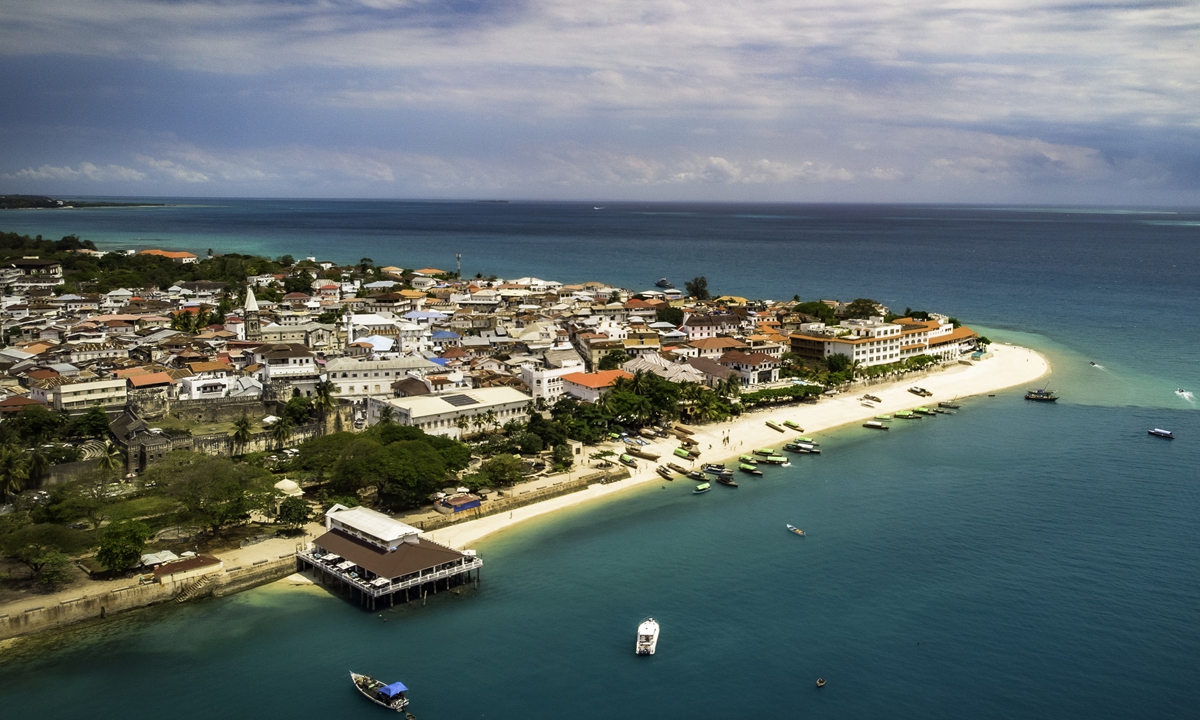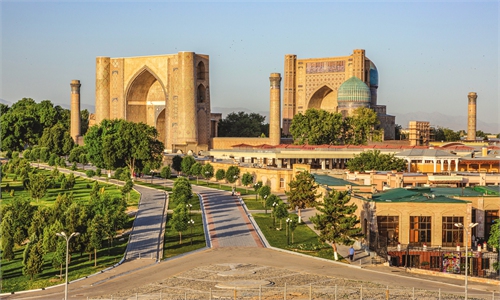ARTS / CULTURE & LEISURE
China-Tanzania Tourism and Culture Year kicks off as Tanzania tries to attract more visitors
Bridging cultures and landscapes

Tanzanian Minister for Natural Resources and Tourism Angellah Kairuki (second from left) attends an event in Beijing on May 16, 2024. Photo: Li Hao/GT
Tanzania, a jewel in East Africa known for its stunning natural landscapes and rich biodiversity, has recently kicked off the China-Tanzania Tourism and Culture Year in collaboration with Chinese authorities.The Tanzanian tourism authority is aiming for an increase in tourist numbers from China, recognizing it as a major source market for tourists.
"We are launching targeted marketing campaigns in China to raise awareness about our rich natural landscapes, wildlife, cultural heritage, and adventure activities," Tanzanian Minister for Natural Resources and Tourism Angellah Kairuki told the Global Times in a recent interview.
"These campaigns will utilize various platforms, including social media platforms, travel websites, and traditional advertising channels."
Partnerships and collaborations with Chinese travel agencies, tour operators, airlines, and media outlets are key components of these promotional efforts. "We aim to forge strong partnerships to promote Tanzania as a preferred tourist destination," Kairuki said.
Cultural exchange events, festivals, and exhibitions in both countries will also play a significant role in fostering mutual understanding and appreciation, she noted.
Out of the tourism attractions in Tanzania, today's Tanzania-Zambia railway is also well-known in China as the project was completed with Chinese support in the 1970s.
A popular Chinese TV drama Welcome to Milele in 2023, which depicts the decades-old China-Africa medical aid cooperation, has also shed light on the landscape of Tanzania.
Rich heritage
Tanzania boasts seven UNESCO World Heritage sites, including the Ngorongoro Conservation Area, Serengeti National Park, Kilimanjaro National Park and Stone Town of Zanzibar.
According to the Bank of Tanzania's economic review, the number of tourists who visited the country in 2023 exceeded 1.8 million, while the forex earnings reported record growth of $3.4 billion, an increase of 36 percent compared to the same period in 2022.
The China-Tanzania Tourism and Culture Year is expected to significantly boost Chinese people's interest in and understanding of Tanzania's tourism landscape, Kairuki stated.
"Our dedicated focus on promoting tourism and cultural exchange will raise awareness among Chinese tourists about Tanzania's diverse attractions," Kairuki said.
"Through targeted marketing campaigns and promotional events, Chinese travelers will learn about our wildlife safaris, pristine beaches, cultural heritage, and adventure activities."
Participating in cultural exchange activities will allow Chinese tourists to immerse themselves in Tanzania's rich cultural heritage, the minister highlights.
"Through cultural performances, art exhibitions, traditional ceremonies, and culinary experiences, Chinese travelers will gain a deeper understanding and appreciation of Tanzanian culture," she said.
"Special events and festivals will provide unique opportunities for engagement, while collaborative partnerships will result in tailored travel packages and customized experiences."

A view of Stone Town of Zanzibar, Tanzania Photo: VCG
Climate change threatThe two countries, which are also celebrating the 60th anniversary of establishing diplomatic ties, both recognize that climate change poses a significant threat to natural environments and wildlife.
To combat these challenges, Tanzania has devised comprehensive climate adaptation and mitigation plans.
"We are committed to investing in renewable energy sources to reduce greenhouse gas emissions," Kairuki said.
"Our policies focus on protecting and restoring ecosystems, establishing conservation areas to safeguard biodiversity, and educating the public about climate change impacts and adaptation strategies."
These efforts are not solitary endeavors of the government, but involve a collaborative approach with various stakeholders, including scientists and local communities, the minister noted.
"By working together, we can develop effective strategies to protect our natural environments and wildlife," Kairuki noted, highlighting the importance of inclusive participation in addressing climate change.
Safety and convenience for tourists are paramount for the sustained success of the tourism industry. The Tanzanian government has in place plans to strengthen service guarantees for tourists.
"We have established dedicated tourist police units in major destinations to ensure the safety and security of visitors," Kairuki said. "These specially trained officers are available to address any concerns or emergencies that tourists may encounter."
Sustainability matters
Sustainable tourism is a crucial focus for Tanzania. The rich natural landscapes in Tanzania require vigilant protection and management. The Tanzanian government has implemented several measures to safeguard these treasures.
"We have established 21 national parks managed by the Tanzania National Parks Authority," Kairuki said. "These parks are governed by strict policies and regulations to ensure wildlife conservation and responsible tourism activities."
In addition to national parks, Tanzania has designated reserves and controlled areas where wildlife conservation is prioritized. These areas are managed by government agencies and conservation organizations.
Community-based conservation initiatives also play a crucial role, actively involving local communities in managing and conserving natural resources.
"This approach not only helps in wildlife protection but also ensures sustainable livelihoods for local communities," said the minister.
Anti-poaching efforts are another critical aspect of Tanzania's conservation strategy.
"We have implemented severe measures to combat illegal hunting and trafficking of wildlife," Kairuki asserts.
"This includes deploying anti-poaching patrols, using technology like drones and GPS tracking, and collaborating with international conservation organizations."
Beach tourism is another area of focus, with investments in infrastructure development, hospitality services, and marketing campaigns to attract water sports enthusiasts and leisure travelers to Tanzania's pristine beaches.
Ecotourism and sustainable lodging options, such as eco-lodges and community-based accommodation are being promoted to minimize environmental impact and support local communities.
Community-based tourism initiatives empower local communities to participate in and benefit from tourism activities, promoting sustainable development and poverty alleviation.
"These initiatives involve local ownership, employment opportunities, cultural exchanges, and revenue-sharing mechanisms," Kairuki said.
The sustainable development of the tourism economy is crucial for Tanzania, and the government is keen on promoting diversification in the tourism sector to reduce reliance on wildlife tourism.
"We are focusing on cultural tourism development, highlighting traditional practices, arts, festivals, and historical landmarks," Kairuki said. "By showcasing our cultural diversity, we attract tourists interested in immersive cultural experiences."



